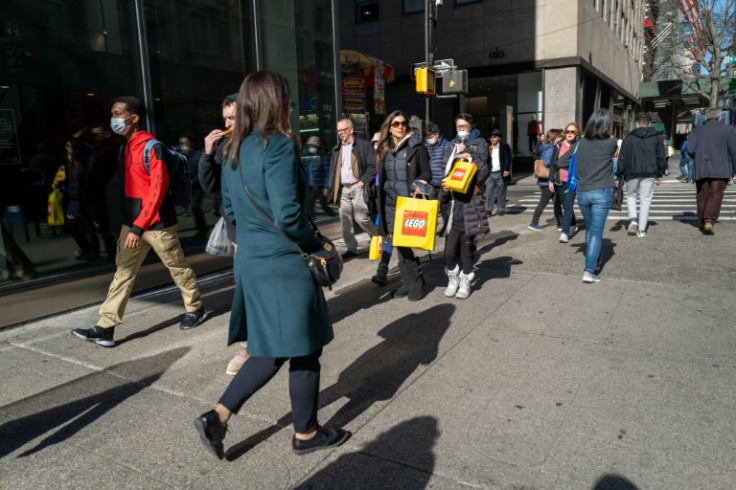Global stocks rise after strong US retail sales, better UK inflation data
That's still a high level of inflation, but the pound's retreat reflected a shift for the foreign exchange market.

Wall Street stocks shrugged off early weakness and pushed higher Wednesday as they followed European bourses upward after strong US economic data.
US retail sales jumped by three percent last month to $697.0 billion, easily topping estimates in the latest indication of strength in the US economy -- something that has sometimes rattled equity investors nervous over potential further Federal Reserve interest rate increases.
That dynamic has sometimes led to the mantra that "good news is bad news" for the stock market.
But analysts said Wednesday's pattern suggested a shift.
"Markets seem to be changing their tune about 'good news being good news,'" said Art Hogan, an analyst at B. Riley Financial, who pointed to greater optimism that the US economy will avoid a sharp downturn, a so-called "hard landing."
The gains by stocks "suggests perhaps that buyers were influenced more by the hopeful economic implications of the January retail sales data than its potentially adverse implications for monetary policy," said Briefing.com.
All three major US indices finished higher, with the S&P 500 winning 0.3 percent.
Still, analysts noted that the US equity and bond markets appeared to be adopting opposite readings of the monetary policy outlook, with the yields pushing higher.
The dollar also strengthened against other currencies.
"Mounting signs of a resilient US economy could soon see markets turn more hawkish on America's rate path than even the Fed," said a note from Joseph Manimbo of Convera Holdings. "The dollar stands to gain a meaningful head of steam as markets price out late year rate cuts and price in the fed funds rate peaking further above 5%."
Meanwhile, London's FTSE 100 index popped above 8,000 points for the first time, bolstered by a bigger-than-expected fall in UK inflation that could see the Bank of England pause its rate-tightening cycle.
The UK Consumer Prices Index (CPI) fell to 10.1 percent in January compared with a rate of 10.5 percent in December, the Office for National Statistics (ONS) said in a statement.
That's still a high level of inflation, but the pound's retreat reflected a shift for the foreign exchange market.
"The pound being crushed, as it is today, is often a bullish factor for the index due to the vast bulk of revenue for FTSE 100 companies being generated outside of the UK," Oanda analyst Craig Erlam told AFP.
The FTSE 100 closed up 0.6 percent at 7,997.83 points.
Frankfurt added 0.8 percent and Paris rose 1.2 percent.
Among individual companies, shares in Barclays slumped as much as 10 percent after the British bank missed its earnings target in the final quarter of last year due to higher provisions for loans it expects to turn sour on fallout from high inflation.
Dutch brewer Heineken reported a jump in 2022 sales after it passed increased costs onto consumers. Net profit fell and its shares rose 2.8 percent.
Airbnb surged 13.4 percent after reporting better-than-expected profits as it characterized travel demand as "strong."
New York - Dow: UP 0.1 percent at 34,128.05 (close)
New York - S&P 500: UP 0.3 percent at 4,147.60 (close)
New York - Nasdaq: UP 0.9 percent at 12,070.59 (close)
London - FTSE 100: UP 0.6 percent at 7,997.83 (close)
Frankfurt - DAX: UP 0.8 percent at 15,506.34 (close)
Paris - CAC 40: UP 1.2 percent at 7,300.86 (close)
EURO STOXX 50: UP 1.0 percent at 4,280.04 (close)
Tokyo - Nikkei 225: DOWN 0.4 percent at 27,501.86 (close)
Hong Kong - Hang Seng Index: DOWN 1.4 percent at 20,812.17 (close)
Shanghai - Composite: DOWN 0.4 percent at 3,280.49 (close)
Euro/dollar: DOWN at $1.0693 from $1.0738 on Tuesday
Pound/dollar: DOWN at $1.2039 from $1.2173
Euro/pound: DOWN at 88.80 pence from 88.21 pence
West Texas Intermediate: DOWN 0.6 percent at $78.59 per barrel
Brent North Sea crude: DOWN 0.2 percent at $85.38 per barrel
© Copyright AFP 2025. All rights reserved.


















